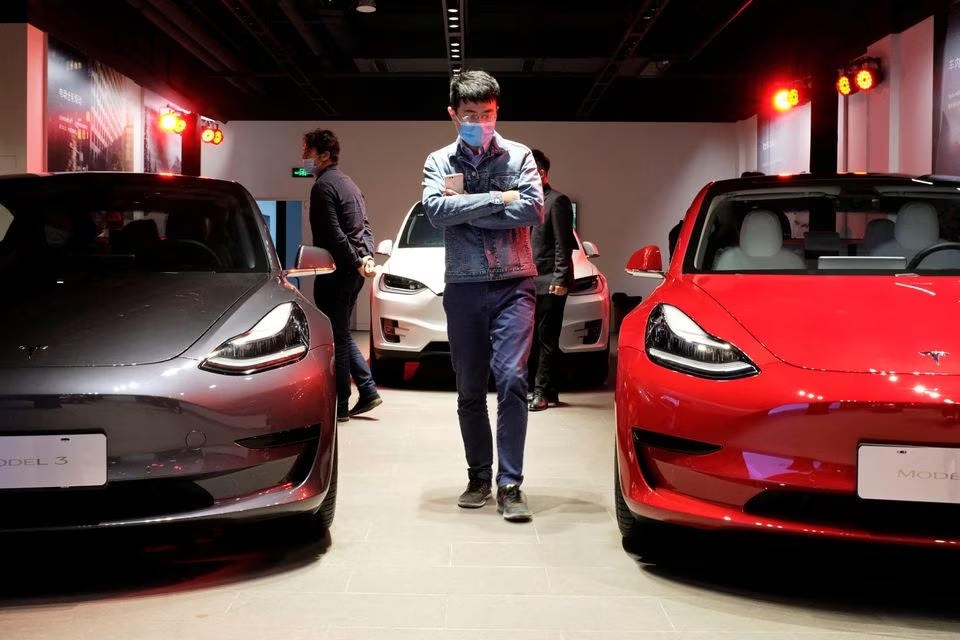SAN FRANCISCO, (Reuters) – Tesla (TSLA.O) is expected to post another record quarter for electric vehicle (EV) deliveries, likely shy of an ambitious 2 million annual internal target that CEO Elon Musk touted at the beginning of the year.
Faced with slowing sales, Tesla leveraged its industry-leading margins and slashed prices of its four car models globally in 2023, with a focus on China, where the company has lost market share to locals including BYD (002594.SZ).
The price war and slowing EV demand, however, have prompted automakers including Ford Motor (F.N) to pull back on their electrification plans, leaving Tesla as the undisputed leader in the United States and helping its stock more than double this year.
“The fourth quarter is typically the strongest of the year in terms of deliveries for Tesla, we’re expecting that to be the case again this year,” said Garrett Nelson, senior analyst at CFRA Research.
Tesla likely delivered 1.82 million vehicles globally in 2023, up 37% from 2022, with about 473,000 units in the fourth quarter, according to 14 analysts polled by LSEG. The EV maker is expected to report quarterly deliveries and production as early as Tuesday.
In January, Musk said that Tesla has the potential to achieve 2 million deliveries this year, if there was no “freaking force majeure”. But as recently as October, he warned that higher borrowing costs were pressuring demand.
The company, which made a year-end sales push by increasing discounts on its key models, has said it aims to achieve a 50% average annual growth rate over multiple years.
Going into 2024, the EV market leader will have to contend with the loss of federal tax credits for some of its cars in the United States as well as in Germany, where the government is prematurely ending its EV subsidy program.
This may force more price cuts next year even though interest rates and battery ingredient costs are expected to ease.
Jairam Nathan, an analyst at Daiwa Capital Markets, trimmed his estimate for Tesla’s deliveries next year to 2.04 million from 2.14 million and said he was modeling for a 4% decline in average revenue per car from 2023.

2024 CHALLENGES
The company is also dealing with a rise in regulatory scrutiny of its self-driving systems and other parts in the United States and in some European countries. Earlier this month, Tesla recalled nearly all of its 2 million vehicles on U.S. roads to install new safeguards.
Musk has previously said he believes full self-driving (FSD) could one day account for most of Tesla’s value.
Analysts polled by Visible Alpha expect 2.2 million deliveries by Tesla next year. Most believe that the newly released Cybertruck and a refreshed Model 3 are not enough to boost demand.
“Tesla candidly admitted the company is now in an intermediate low-growth period,” Deutsche Bank analyst Emmanuel Rosner wrote in a note, citing a meeting with Investor Relations Chief Martin Viecha.
Investors expect Tesla’s margins to remain pressured as the company ramps Cybertruck production and prepares to launch a cheaper car platform.
Musk has said Cybertrucks will be a small percentage of the vehicles Tesla makes next year and that there are “enormous challenges” in reaching volume production for the pickup, whose controversial design has divided fans.
Tom Narayan, an analyst at RBC Capital Markets, said in a report that Cybertruck would represent 3% of Tesla’s volumes in 2024, calling it more of a “halo” product that could attract consumers to the brand.
Reporting by Akash Sriram in Bengaluru and Hyunjoo Jin in San Francisco; Editing by Sayantani Ghosh and Devika Syamnath











